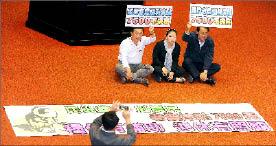The Legislative Yuan yesterday passed an amendment to the farmers’ pension statute that would raise monthly payments for elderly farmers from the current NT$6,000 to NT$7,000 starting next year.
The pension will also be adjusted every four years based on changes in the consumer price index, according to the amendment.
The amendment includes a clause disqualifying wealthy farmers from the pension program starting on Jan. 1, 2013.

Photo: Liu Hsin-de, Taipei Times
The clause targets those whose income from non-agricultural sources exceeds NT$500,000 (US$16,578) per year or who own non-farm property worth more than NT$5 million.
This excludes residential property worth less than NT$4 million in which farmers are living. Farmers who are already covered by the program before that date will not be affected.
As private residences are not counted in the property valuation, the clause would affect only several hundred people, the Chinese Nationalist Party (KMT) caucus said.
The amendment was voted through the legislature with backing from the KMT majority.
Although the Democratic Progressive Party was in favor of -increasing the farmers’ pension, it also said that no farmers should be excluded from the program based on their wealth or lack thereof.
Several KMT legislators from agricultural regions — such as Wong Chung-chun (翁重鈞) from Chiayi County, Chung Shao-ho (鍾紹和) from Greater Kaohsiung and Chang Chia-chun (張嘉郡) from Yunlin County — also opposed the exclusion clause.
In the voting process, the legislators held up a banner that read, “Against depriving people of their rights” to voice their protest.
KMT Legislator Lin Yi-shih (林益世), head of the KMT’s policy committee, said the clause was introduced in line with the principles of fairness and justice, adding that a similar exclusion clauses applies to welfare programs for the disadvantaged.

Alain Robert, known as the "French Spider-Man," praised Alex Honnold as exceptionally well-prepared after the US climber completed a free solo ascent of Taipei 101 yesterday. Robert said Honnold's ascent of the 508m-tall skyscraper in just more than one-and-a-half hours without using safety ropes or equipment was a remarkable achievement. "This is my life," he said in an interview conducted in French, adding that he liked the feeling of being "on the edge of danger." The 63-year-old Frenchman climbed Taipei 101 using ropes in December 2004, taking about four hours to reach the top. On a one-to-10 scale of difficulty, Robert said Taipei 101

Nipah virus infection is to be officially listed as a category 5 notifiable infectious disease in Taiwan in March, while clinical treatment guidelines are being formulated, the Centers for Disease Control (CDC) said yesterday. With Nipah infections being reported in other countries and considering its relatively high fatality rate, the centers on Jan. 16 announced that it would be listed as a notifiable infectious disease to bolster the nation’s systematic early warning system and increase public awareness, the CDC said. Bangladesh reported four fatal cases last year in separate districts, with three linked to raw date palm sap consumption, CDC Epidemic Intelligence

Taiwanese and US defense groups are collaborating to introduce deployable, semi-autonomous manufacturing systems for drones and components in a boost to the nation’s supply chain resilience. Taiwan’s G-Tech Optroelectronics Corp subsidiary GTOC and the US’ Aerkomm Inc on Friday announced an agreement with fellow US-based Firestorm Lab to adopt the latter’s xCell, a technology featuring 3D printers fitted in 6.1m container units. The systems enable aerial platforms and parts to be produced in high volumes from dispersed nodes capable of rapid redeployment, to minimize the risk of enemy strikes and to meet field requirements, they said. Firestorm chief technology officer Ian Muceus said

MORE FALL: An investigation into one of Xi’s key cronies, part of a broader ‘anti-corruption’ drive, indicates that he might have a deep distrust in the military, an expert said China’s latest military purge underscores systemic risks in its shift from collective leadership to sole rule under Chinese President Xi Jinping (習近平), and could disrupt its chain of command and military capabilities, a national security official said yesterday. If decisionmaking within the Chinese Communist Party has become “irrational” under one-man rule, the Taiwan Strait and the regional situation must be approached with extreme caution, given unforeseen risks, they added. The anonymous official made the remarks as China’s Central Military Commission Vice Chairman Zhang Youxia (張又俠) and Joint Staff Department Chief of Staff Liu Zhenli (劉振立) were reportedly being investigated for suspected “serious